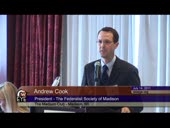Some politicians say they don’t pay attention to what polls show. Gov. Scott Walker is one of them. Most of those who say that actually do pay attention to polls. I assume Walker is one of them.
That’s certainly as good a way as I can think of to explain what is clearly an effort by Walker to move toward the middle on at least some issues, particularly education quality matters. In just over a half year in office, Walker has become an especially polarizing figure. Many on the right think he has changed the long-term future of Wisconsin for the better and praise him enthusiastically. Many on the left think he is so bad that they will succeed in bringing him to a re-call election next year. Some polls show that there are stronger feelings about Walker, both pro and con, with little middle ground, than is true for any other governor currently.
But, ultimately, in a state that is as politically split as Wisconsin, it is valuable, if not essential, to have support among many of those in the middle. And Walker’s overall poll numbers are down in the light of the ferocious battle over the state budget.
So maybe I shouldn’t have been surprised when Walker took more moderate positions in an interview I did with him on July 1 on education issues. He referred several times to his desire to build consensus on some major issues and said it was “the Wisconsin way” to get a wide range of people together to work on issues. He talked about how he was building a strong relationship with Tony Evers, the state superintendent of public instruction, on matters such as a new school accountability system, new state tests, and an initiative aimed at increasing the overall quality of the work of principals and teachers. The generally-liberal Evers has been backed by teachers unions and was strongly critical of some major parts of the budget proposals from Walker, a conservative Republican.
Walker’s comments and subsequent conversations with him and Evers led to a story I wrote for the July 10 Milwaukee Journal Sentinel and a column I did on Walker’s education thoughts on July 17. The audio of my interview with Walker is availabkle on the latter Web page.

